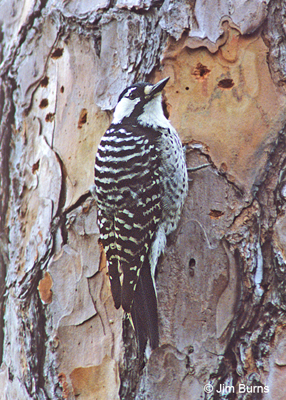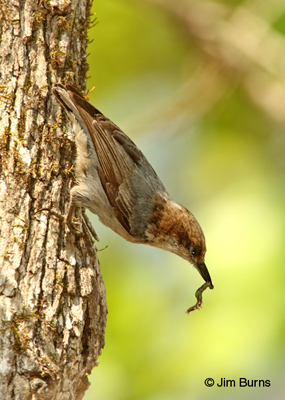
But I didn’t become White. I was born this way. So, in the midst of this tumultuous perfect storm of protest and pandemic, I have felt an obligation to acknowledge my White privilege while trying to relate on some personal level to the emotional stress so many in our society feel daily, if not hourly, at being “othered.” I have a birding story to recount, an incident in which I was “othered,” just one White person’s personal microcosm of what this new term in the lexicon of post-woke society has come to mean.
It was springtime in the Florida panhandle, recently enough that I still have frequent flashbacks to the experience, and I was exploring the backwoods of the area, a mosaic of national forest and private holdings, looking for avian specialties of the Southeast which I had not seen often or photographed well. I had crossed over the Alabama line and found a short gravel road leading to a “Y,” the left fork disappearing over a hill through fenced fields, the right dead ending where a pile of boulders precluded vehicular access to a grassy, overgrown utility pole lane thirty yards wide through forest on both sides.
Perfect, I thought, as I parked at the boulders. Once bitten, twice shy, I of course assiduously glassed for “no trespassing signs”, saw none, even along the fence line to the left, and started up through the lane between the trees, binoculars around my neck, 600mm lens on tripod over my shoulder, fanny pack and knee pads securely fastened. About sixty yards out I discovered a small marshy area, heard bird activity along a small creek coming out of the trees and, feet already wet, sloshed into the forest following the water.
Just as I set the tripod down to glass a small flock of songbirds feeding through the pines I heard shouting from the direction of my rental car, out of sight because of the right turn I had taken into the forest. The voice sounded male, urgent, and angry. Uh oh. I couldn’t see him because of the trees and knew he couldn’t see me, but his tone resonated in my gut. I backtracked out into the lane where he could see me, waved, and shouted hello. Then I raised the binoculars to focus more closely on him and what his issue might be. That’s when my stomach began to churn.
He was White, powerfully built, and thirty-something. He was now standing beside the camouflaged 4 x 4 ATV in which he had driven up, he was looking over my rental car, and he was not happy, but what made my skin crawl was the shotgun he was carrying, not over his shoulder but hanging loosely by his side in one hand, pointing in my direction. I was sixty yards away but really had only one option. I started walking toward him, slowly because of all the gear I was carrying, trying to smile to hide the chagrin and fear coursing through my body. It was the longest sixty yards of my birding life.
As I walked up to him and he brusquely questioned what I was doing, his tone was confrontational and belligerent, and I guessed he had never expected, nor even in his wildest dreams had ever seen, an individual my age, dressed as I was, carrying the equipment I was, walking around freely in his neck of the woods. He was a young, southern, rural, land-owning backwoodsman secure in his realm, and I was an old birdwatcher wearing knee pads, pant legs stuffed into my socks, carrying strange equipment and strolling through or near his private property. My feeling of not belonging, of being in the wrong place at the wrong time, my sense of “otherness,” was raw and palpable.
I had stopped smiling because he had never smiled back or shown any glimmer of friendliness, but I made it a point to be courteous and to not let him see how badly my hands were shaking as I shed my gear and stowed it in the car. He never used the word “trespassing,” but his tone and questions implied he thought I was. Apologetically I began to tell him I had looked for signs indicating the area was posted, but he was having none of it and cut me off. Legality aside, I wasn’t going to argue with a shotgun.
He never pointed the gun at me, but he never set it aside and, as I packed up my camera amidst fraught moments of silence and visceral tension, it crossed my mind he seemed to be deciding whether or not to even let me leave. As I finally moved to the driver’s side, apologized again, and turned the key, he never moved away from my front fender but just stared as if his eyes could hurry me along. They did because they held not a hint of our shared humanity.
This was but one short, uncomfortable incident in a long, comfortable birding life, but as I have witnessed the angst sweeping our country for the past eight months, the memory of it has helped me to understand what the “others” in our society must feel, fear, and navigate on a daily basis. It has conjured scenes from the roots of my coming of age in the ‘60s, a time when I knew who I wanted to become and hoped the country would become. A time when so many of us back then realized the term ”brother” was built on the word “other” and assumed we were evolving past the dichotomy of those two terms.
As social psychologist Jennifer Richeson says in a recent Atlantic article, “the mythology of racial progress is corrosive.” The memory of that birding incident and Richeson’s provocative article have forced me to question who I have become and where the country is going. We cannot be birders without caring about the planet. We cannot care for the planet without recognizing the interconnectivity of all that inhabit it. If I may cliché again, we are all in this together, and if we choose not to accept this truth, then our species is facing an existential issue.